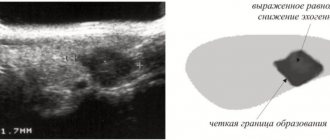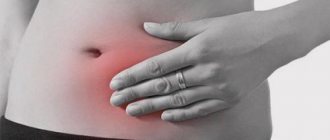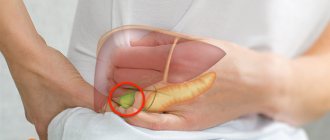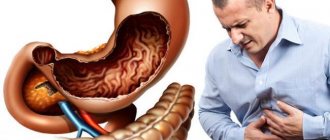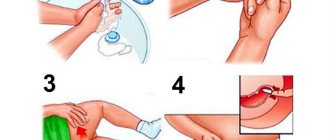Acute stomach pain is one of the most common symptoms, which indicates the presence of acute and chronic diseases of the gastrointestinal tract. To diagnose the disease, specialists determine the nature of the pain, its intensity, and the area of development of painful symptoms. Acute pain in the stomach is also caused by other factors, which representatives of the private medical clinic “KDS Clinic” will tell you about.
Acute pain in the stomach occurs not only with disorders of the gastrointestinal tract. With this symptom, problems with the kidneys, liver and other organs are diagnosed. If the patient is bothered by acute pain in the stomach, the treatment method depends on the patient's condition. Experts resort to the following treatment options:
- Traditional methods;
- Drug treatment;
- Homeopathy;
- In advanced cases - surgical intervention.
What are the causes of constant stomach pain?
Constant pain in the stomach often indicates the presence of gastrointestinal disease. Therefore, the causes of pain may be:
- Pancreatitis. With pancreatitis, the patient feels a sharp pain in the upper abdomen. Pain syndromes intensify after eating.
- Cholecystitis,
- Duodenal ulcer,
- Gastritis. Pain appears on an empty stomach and after eating. The cause of gastritis is considered to be irritation of the mucous membrane.
- Food poisoning. Accompanied by nausea and vomiting, frustration, dizziness and headache.
- Stomach cancer. The patient experiences bloody vomiting, rapid weight loss, and bad breath.
Other causes of acute stomach pain:
- Wrong food intake. The appearance of cutting pain after eating is a typical phenomenon for those who eat junk food. If you eat improperly, a large amount of gastric juice is produced and the metabolism in the body is disrupted. You should avoid eating fatty foods, flour, sweets, and alcohol.
- Internal organ injuries.
- Physical exercise. Sports should be done after consulting a specialist.
- Allergy. With allergies, patients experience acute pain in the stomach.
- Infections. For infections of the gastrointestinal tract, the main symptom is acute pain in the stomach.
Specialists from the private medical clinic “KDS Clinic” added that the state of the gastrointestinal tract is affected by the emotional state of the patient, the presence of stress and stress on the nervous system. The systems of the human body are interconnected.
Treatment
Since stomach pain is only a symptom of the disease, it is necessary to direct efforts to eliminate it. The patient is prescribed medications to reduce the intensity of disturbing symptoms, relieve spasms, and detoxify the body.
Features of treatment for various diseases:
- In case of poisoning, help must be immediate. Gastric lavage is performed, after which the patient is prescribed sorbents designed to relieve intoxication. Compliance with the drinking regime and rehydration therapy are mandatory. If you experience black stool or vomiting blood, you should immediately consult a doctor.
- If the gastric mucosa is damaged (gastritis), medications are prescribed to reduce high acidity. An ulcer requires the use of antacids. If Helicobacter pylori is detected, a complex regimen based on 2 or 3 antibiotics is prescribed.
- Increased muscle tone is relieved with antispasmodics.
- When the pancreas is damaged, as well as to facilitate digestive processes, enzymes are used.
- For cancerous tumors, polyps, bezoars, appendicitis and ulcer perforation, surgery cannot be avoided.
- Constipation requires adjustments to diet and lifestyle, as well as the use of prokinetics.
Before diagnosis, it is recommended to follow a gentle diet. It is necessary to avoid fatty, spicy, smoked, fried foods. Food is consumed warm. Alcohol is strictly prohibited. Avoid raw vegetables and legumes, as they can cause flatulence and make you feel worse.
You can take low-fat broths, pureed dishes, bananas, and rice. You need to eat in small portions, chewing foods thoroughly. If they need heat treatment, they are boiled or steamed. When there is no appetite, there is no need to force yourself to eat.
First aid for stomach pain
If stomach discomfort occurs, you should refuse food. You should lie down in bed and relax. It is not recommended to immediately take medications to relieve pain. They can mask the progression of a serious disease or aggravate its course.
What you can do if you have mild pain:
- If you have an appetite, drink warm low-fat broths and water.
- You can take a comfortable position in bed, pressing your knees to your stomach.
- In case of poisoning, it is permissible to take sorbents.
- You need to drink a lot of water.
- You are allowed to place a cold towel on your stomach.
If you feel worse, you should consult a doctor.
To reduce pain, it is forbidden to use a heating pad or apply it to the stomach or other parts of the body. With bleeding and purulent complications, such therapy can lead to progression of the process and death.
Diagnosis of acute cutting pain in the stomach
If you are concerned about the above symptoms, we advise you to go to the clinic and undergo diagnostic tests. Diagnosis of acute pain in the stomach is as follows:
- Consultation with a gastroenterologist. Highly qualified doctors at the private medical clinic “KDS Clinic” will help you find out about your health status and diagnose the disease as soon as possible. After the doctor conducts an initial examination and palpation of the stomach, he will determine the nature, frequency and intensity of pain. It can be aching, cutting, dull and sharp. The diagnosis depends on the nature of the pain.
- Taking tests. Patients undergo a general analysis of blood, urine, and stool. Patients then undergo diagnostic examinations. The examination method depends on the patient's condition.
- Endoscopy. The examination method is the most accurate and allows you to diagnose stomach diseases
To diagnose the complete condition of the body and find out about the presence of other diseases, patients are referred for ultrasound diagnostics. You will undergo an ultrasound examination of the abdominal organs. In some cases, examinations are performed using contrast fluid.
Such procedures include computed tomography and magnetic resonance imaging. Computed tomography and magnetic resonance imaging are the most accurate examinations in modern medicine. You will be able to see changes in the body, learn about neoplasms and disorders.
In addition to acute pain, patients experience:
- sharp pain in the stomach;
- dull pain in the stomach;
- aching pain in the stomach.
Sharp pain in the stomach appears due to the production of gastric juice and irritation of the damaged gastric mucosa. Sometimes the disease develops into gastritis and duodenal ulcer.
Dull pain in the stomach occurs with chronic gastritis. The pain is nagging in nature and occurs after eating. When dull pain occurs, patients are diagnosed with duodenitis. Duodenitis is inflammation of the duodenal mucosa. Pathology manifests itself in all age categories. Acute and chronic duodenitis are classified.
Aching pain in the stomach occurs when bacteria appear in the body. These include infectious diseases. Aching pain is affected by an incorrectly formulated diet, consumption of harmful foods, and chronic gastritis. Pains of this nature appear during the day and at night.
Diagnostic methods
It is possible to understand the cause of stomach pain and determine the correct treatment tactics based on instrumental and laboratory studies. At the initial examination, the localization and nature of pain is determined by palpation, as well as the degree of its irradiation.
Next, a set of studies may be prescribed:
- Ultrasound - determines the condition of the organ wall;
- MRI, CT are more informative methods that are necessary if tumors are suspected;
- clinical and biochemical blood tests;
- urine and stool tests;
- probing of the stomach and duodenum with further examination of the contents (acidity is determined, microscopy and bacterial culture are performed).
Diagnosis begins with simpler methods that allow you to identify the most common stomach diseases. If necessary, additional studies are prescribed. The Clinical Institute of the Brain has all the conditions for conducting a comprehensive diagnosis of stomach pain.
We diagnose and treat acute stomach pain
Representatives of our medical clinic “KDS Clinic” diagnose the presence of diseases in the early stages. You will receive consultation during the initial examination and further treatment. Clinic experts will examine you and receive test results as soon as possible. You can find prices for all types of diagnostics on our official website.
The clinic regularly runs promotions for comprehensive examinations of all body systems. All detailed information is posted on the website of the private medical clinic “KDS Clinic”. We are located in Moscow, at the address Dmitrovskoe sh., 81. Be healthy!
Causes of gastritis
The main causes of gastritis are:
- poor nutrition;
- hasty eating and poorly chewed food or dry food;
- eating food that is too hot or too cold;
- eating savory foods (mostly spicy and highly salted);
- smoking;
- alcohol consumption;
- stress;
- infection with the microbe Helicobacter pylori;
- chewing gum on an empty stomach.
Modern methods of examining the stomach
Based on the results of the analysis, it is possible to assess the general condition of the body, morphological tissue damage, determine the functional characteristics of the organ, determine the stage of the inflammatory process and the effectiveness of therapy.
Today, special gastroenterological panels have been developed, including a set of tests with blood taken from a vein. The panel may include, for example, tests for the level and proportions of pepsinogens I and II, stimulated or basal gastrin-17, for the presence of antigens (IgG) to the bacterium Helicobacter pylori, which can lead to H. pylori-associated chronic gastritis. In addition, indications for such a study are usually the risk of peptic ulcer disease and various dyspeptic disorders.
It is known that during inflammation of the pancreas, the enzyme lipase (triacylglycerol acylhydrolase) enters the blood, so if lipase can be detected in the blood in a volume of more than 78 U/l, we can talk about acute or chronic pancreatitis or a perforated gastric ulcer.
To confirm or refute autoimmune pathologies of the stomach (chronic atrophic gastritis, pernicious anemia, etc.), blood serum is taken for antibodies (IgG, IgA, IgM) to the parietal cells of the stomach, as well as for antibodies (IgG) to the internal Castle factor and antibodies ( IgG) to Saccharomyces - baker's yeast Saccharomyces cerevisiae (ASCA).
Although perfect specific tumor markers for gastric cancer have not yet been discovered, it is known that the level of some antigens correlates with the stage of cancer. Such antigens especially include oncofetal carbohydrate antigens CA 72-4 and Ca 19-9. The latter is used to monitor pancreatic carcinoma together with carcinoembryonic antigen (CEA).
Symptoms of gastritis
So, how can you recognize that you have begun to develop gastritis? It is worth listening to your body and analyzing why pain bothers you, at what time it occurs and how often it happens.
Symptoms of gastritis:
- abdominal pain: sharp paroxysmal or constant painful;
- nausea is constant or intermittent, often occurring immediately after eating;
- heartburn;
- belching with a sour smell;
- repeated vomiting (in the case of acute gastritis, vomiting with blood is possible, since internal bleeding may open in the stomach);
- increased salivation;
- sometimes dry mouth;
- bowel dysfunction: constipation or diarrhea;
- from the whole body: severe general weakness, dizziness, headache, sweating, increased temperature, decreased blood pressure, increased heart rate - tachycardia;
- decreased appetite;
- unpleasant taste in the mouth;
- feeling of heaviness in the stomach after eating;
- bloating, rumbling in the stomach, flatulence;
- anemia, brittle and dry hair, split nails.
When you need medical help
You need to seek emergency help if:
- The pain is very strong and does not subside after taking the pills for an hour.
- During pregnancy.
- The stomach has become hard, the muscles on it are tense.
- The attack is accompanied by nausea, vomiting, bleeding from the vagina, rectum, and ureter.
- The temperature rose.
You should not neglect contacting a doctor even with less severe symptoms. An examination using ultrasound, MRI, and laboratory tests will help you understand why your stomach is bothering you. The list of diagnostic methods and measures for treatment will differ in many ways for different diseases. You can start by consulting a therapist or immediately contact a specialist if you suspect a specific disease.
Children's and Children's Center "Kutuzovsky" is a multidisciplinary clinic where doctors of various specializations are ready to see you seven days a week. Sign up online for a convenient time and come to the address: st. Davydkovskaya, 5. We will find the cause of disturbing symptoms and how to help in any situation.
The contents of this article have been checked and confirmed for compliance with medical standards by general practitioner Yulia Vladimirovna Butskikh.
How to treat
Therapy for stomach pain is aimed at treating the underlying disease.
Conservative treatment includes relief of symptoms, pain relief and removal of toxins.
Surgical treatment is prescribed if there is no effect from taking medications and if malignant tumors are detected.
First aid for stomach pain
If you have stomach pain, it is better to stop eating for a while and lie down quietly.
You should not immediately take painkillers, as they can irritate the mucous membranes and aggravate the condition. If you have stomach pain:
- replace food with warm drinks and low-fat broth;
- you need to lie down, pressing your knees to your stomach as much as possible;
- place a cold towel on your stomach;
- massage your stomach in a circular motion;
- in case of poisoning, take activated carbon or other absorbents;
- drink as much plain, clean water as possible.
Seek medical help as soon as possible.
Drugs
The choice of medications is determined by the cause of stomach pain. The doctor may prescribe:
- antisecretory agents that reduce acidity;
- antacids that neutralize the stomach environment;
- antispasmodics to relieve pain;
- prokinetics to stimulate intestinal motility;
- gastroprotectors to protect the gastric mucosa from aggressive influences.
Only a doctor can select a treatment regimen based on the results of the examination.
Diet
Any pain in the stomach requires a gentle diet. There is no need to force yourself to eat if you have no appetite.
You should eat regularly, avoid spicy, smoked and fried foods, do not eat too hot food, and be sure to have breakfast. The best foods for stomach pain are bananas, rice, applesauce, and toast (Figure 5).
Figure 5. Diet rules for stomach pain. Source: MedPortal
Folk remedies
For stomach pain, decoctions and infusions of berries and vegetables help well:
- gooseberry infusion (pour a few glasses of water over the berries and boil for 15 minutes, drink every 2 hours),
- potato juice (three times a day before meals),
- rowan infusion (one tablespoon before meals),
- white cabbage juice, cucumber, pomegranate, quince juice (drink before meals),
- decoction of crushed oats,
- rye bran infusion,
- dandelion syrup,
- infusion of dill seeds,
- white mistletoe decoction.
Pharmacies offer a wide range of herbal teas to normalize stomach function, but before using any herbal remedy, you should consult your doctor.
Diet for gastritis
For gastritis with low acidity
Can:
- boiled lean meat: chicken, rabbit;
- meat broths;
- lean fish: pink salmon, hake, cod;
- vegetables in the form of puree or grated: carrots, potatoes, green peas, beets;
- ground fruits, compotes and jelly from apples, raspberries and strawberries;
- porridge (oatmeal, semolina, rice);
- low-fat cottage cheese, milk;
- only squeezed cabbage juice;
- alkaline mineral waters, for example Borjomi (1 glass an hour before meals).
It is forbidden:
- hot and spicy dishes;
- canned food;
- mustard;
- pepper;
- onion;
- hot sauces.
For gastritis with high acidity
Can:
- pureed vegetarian soups;
- dairy products;
- lean fish and boiled meat;
- scrambled eggs;
- porridge, jelly, jelly;
- vegetable purees;
- compotes from fresh (not sour) fruits;
- carrot juice;
- White bread.
It is forbidden:
- coffee and strong tea;
- meat broths;
- smoked meats;
- mustard;
- onion;
- garlic.
For all types of gastritis, split meals are very important - 5-6 times a day.
Gastritis (from the Latin gastritis, from the ancient Greek γαστήρ (gaster) - “stomach” + -itis inflammatory or inflammatory-dystrophic changes in the mucous membrane) is a collective concept used to refer to inflammatory and dystrophic changes in the gastric mucosa of different origins and course. Damage to the mucous membrane can be primary, considered as an independent disease (due to poor nutrition), and secondary, caused by other infectious and non-infectious diseases or intoxication.
Gastritis is perhaps the most common disease of the gastrointestinal tract. Almost every second resident of our country suffers from it.
If you are really looking for your doctor...



